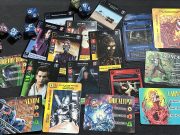 “Why are there three toads and a container of chicken feet in the kitchen?” my ever-so-patient wife asked me the other day.
“Why are there three toads and a container of chicken feet in the kitchen?” my ever-so-patient wife asked me the other day.
“I’m working on something,” I responded as I walked back into the kitchen carrying a blender and a book with a brown paper cover and “Alchemy” scrawled on the front.
“Is that my cookbook?”
I looked at her only glancing down once at the book in my arms before responding, “Maybe.”
“Qwark” a toad, helpfully, chimed in.
“NO!” my wife said as her maternal instincts kicked in. “Isn’t there a board game that can do this for you?”
There is and it’s the subject of today’s review of Little Alchemists which is an app-assisted game of mixing items to brew potions for two to four players aged eight and up. No blending of live frogs required.
Gameplay Overview:
The goal of the Little Alchemists is to brew potions to learn what components can make which types of potions. The game is played over several sessions as you start to unlock boxes with additional content that adds various wrinkles to the game. To avoid spoilers, I’m only going to cover the basics but even then, the spoilers would be like telling what happens near the end of the movie Titanic (apologies to the three people who didn’t already know).
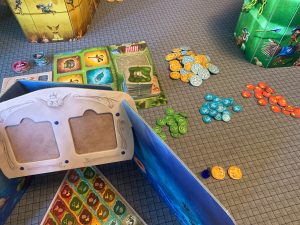
On your turn, you can brew a potion and buy ingredients. Ingredients can be purchased from the market for one coin each but the spaces in the market are not filled back in until the end of your turn. There is also a rule that allows you to reshuffle the market if 4 or 5 of the tiles are the same component.
To brew a potion place two tiles on your ingredient holders, without telling anyone what you used, and use the app to take a look at them. The app will tell you what potion you made and you’ll announce it and then place a token on the corresponding slot on tracker behind your screen. This seems to be randomized so the same two ingredients may brew different potions game to game. If you mix two identical ingredients, you’ll get to draw an ingredient from the market but won’t brew a potion. At the conclusion of your turn, put the two tiles you brewed with back in the discard pile and draw replacement tiles.
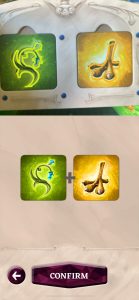
Once the ingredient stack has been used, a customer arrives who will want to buy a certain type of potion for coins and each player can sell that customer a single potion (indicated by placing your colored bottle on that tile to show they bought a potion from you).
The game continues until the market has been exhausted and there are no more customers. Whoever has the most points wins. Ending the game earlier will grant additional keys to unlock more content.
Subsequent levels add more features, like sharing a theory of what two types of potions an ingredient makes to score point tokens (or lose 1 point if you get it wrong) instead of brewing a potion. Other levels add new potion types, more customers, more ingredients, and additional ways to generate income. I’ll discuss some of these things in additional detail in the next section.
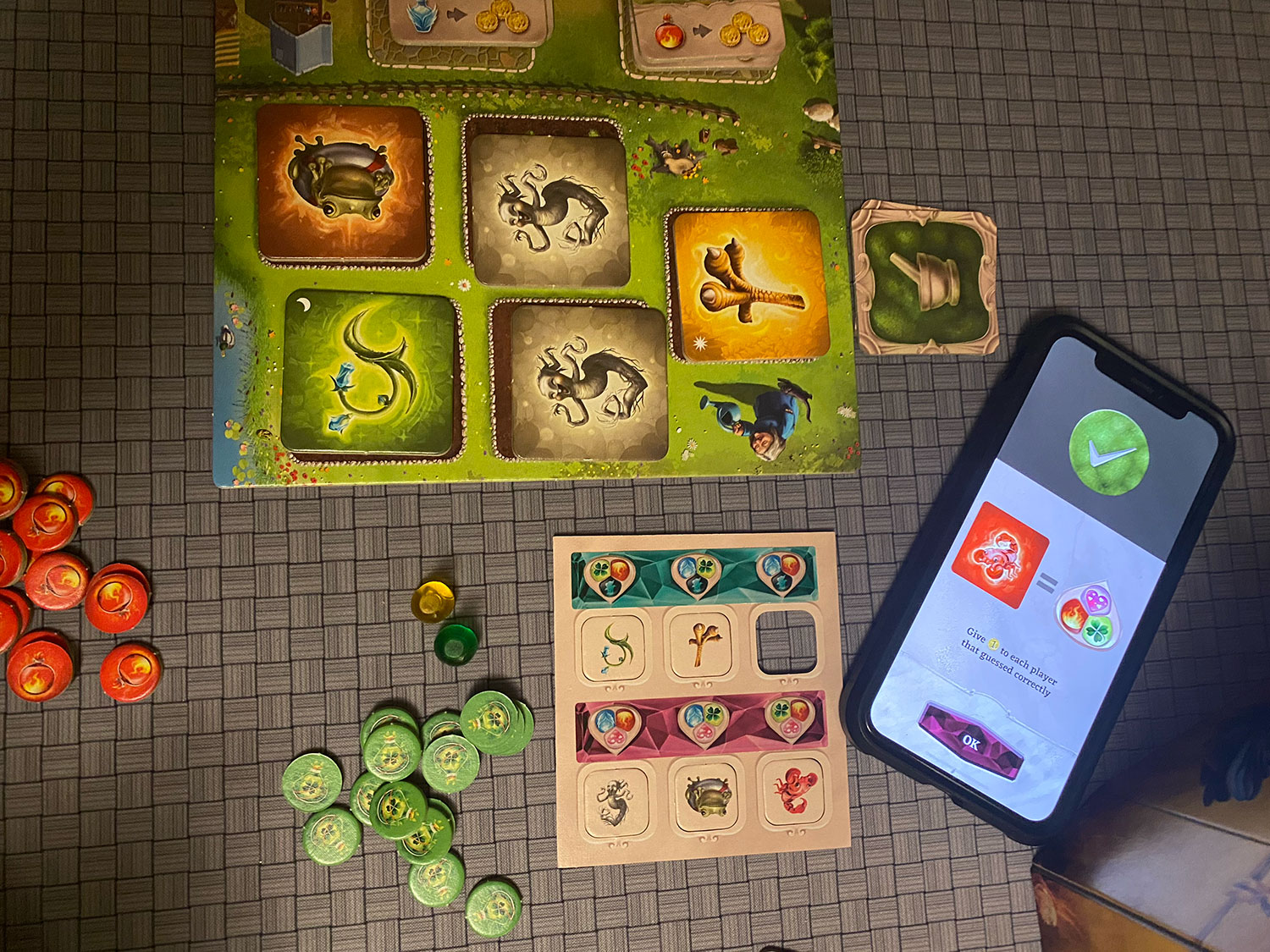
Game Experience:
This is a competitive game where each player is trying to earn the most points but you earn more keys by being efficient as a group. I’m not that competitive (and that’s not just because I’m bad at games but also that) but somehow I’ve never felt more “I don’t care about winning” than I have here as I’ve been more interested in seeing what’s next than trying to outscore my family.
I have never played the grown-up version of the game Alchemists but it seems to be fairly similar for the potion brewing aspect. There’s a little less going on and fewer ingredients to juggle making it a good game for families and children. Maybe.
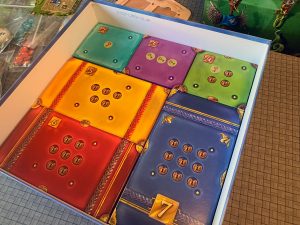
While the box says 7+, this could be hit or miss for your kid(s) based on their abstract thinking abilities. Tony, who reviewed the original game, tried the game with his kids (who I believe are relatively experienced gamers at six going on beating him fairly frequently in games) but said they struggled with some of the deduction portions of the game. He asked if I’d like to try it with my nine-year-old (who also seems to wallop me at a lot of games). My kid was able to wrap his head around these concepts pretty easily and it generally clicked for him. The repetitive gameplay loop is snappy as we’d happily pass my phone back and forth brewing potions and crafting theories. We’ve opened four boxes so far and looking forward to the next one (we just missed it by one key last game).
As you play sessions of the game, key stickers are placed on the next box to unlock it and when you get to a certain number, you get to open that box and add some additional content. This makes resetting a bit of a pain and can make adding players mid-campaign maybe player dependent. As an experiment, my wife jumped in for her first game when we unlocked the second box and she was able to wrap her head around the game within a few turns. However, at the end of that game, we unlocked the third box and she said she wanted to play again at level 2 before adding more content to make sure she understood.
Meanwhile, I could probably break this out with most of the BGQ staff halfway through the game and they’d pick it up because they’re used to these types of gaming concepts and there’s no Thunder Road-like dice for Chris to struggle to read.
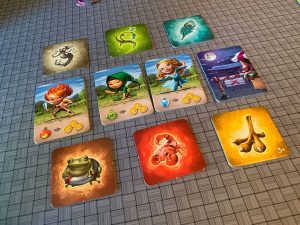
Much like its big brother, gets better as you go and I’m happy they ease kids/families in, but I did find the first chapter pretty underwhelming. The unlock system is a double-edged sword in that it’s great that it slowly rolls out new content but there’s been times when I didn’t want to replay a level just to get to the next small feature. There’s a bit of stretching the game out with this unlock system but you can house-rule changes to suit your needs.
Having the boxes covered in stickers may not make this the easiest game to reset, give away, or sell. The rulebook, which is broken down by chapter/box, has explained the contents of each box which is helpful for resetting. I’m still thinking we’re going to finish this campaign which tells me that this has been a pretty solid hit for my family.
One game, I made a mistake on my tracker board and found that doing so will sink you faster than the Titanic (don’t act like you didn’t know). However, with games averaging around 30 minutes with two players, scoring poorly isn’t a big deal although, this seems to be a game that I give zero fluxweeds about winning, for some reason. So your mileage may vary.
Lastly, the game uses an app so if that’s a non-starter for you, you should skip this one. It looks like they removed the GM role from this game, which is great because that sounded horrible.
Final Thoughts:
Little Alchemists is a fun activity but as a competitive game, I kind of don’t care if I win or lose. But, I do get a lot of proud parent moments as my kid crafts theories correctly and makes strategic decisions. Even putting my lack of competitiveness aside, there’s something about the overall experience that I’m really enjoying and I look forward to unlocking the rest of the content which is more than I can say about a lot of games.
Final Score: 4 Stars – Little Alchemists is a semi-competitive deduction game that’ll have you itching to unlock new game elements as you brew potions without having to clean up your laboratory equipment
 Hits:
Hits:
• Fun app-based deduction game
• Components are high quality and fun to play with
• App works great and replaced the original’s friendship-ending GM mode
• I’m excited to unlock more content
Misses:
• Unlock system seems to drag out the experience
• May not be the best for different players to drop in mid-campaign
• App use is required
• Resetting may be challenging



